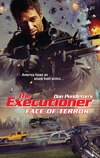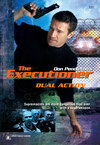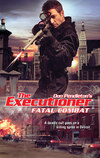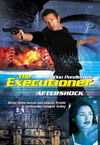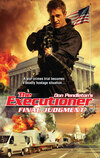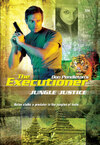Kitabı oku: «Face Of Terror», sayfa 3
“That does sound a little off the wall,” Jessup said.
“Maybe not,” Bolan said, shaking his head. “These men—Arabs, Iranians or whoever they actually are—were trained someplace and trained well. So far, I’d put their skills right up there with our own Special Forces.”
Brognola looked a little surprised. Bolan, he well knew, was former Army Special Forces himself, and now he was comparing these robbers, kidnappers and murderers to other men like himself.
Bolan directed a weary smile at his old friend. “Don’t take that wrong, Hal,” he said. “All I’m saying is that as well as being more-than-competent fighters, they’re smart. And they know that while the FBI will be trying to catch them, the Feds won’t pull anything stupid that puts the victim in further jeopardy. They’ll ask for an FBI agent to deliver the money, too, is my guess. Because the Feds’ first concern is getting the girl back safe and sound. Fathers—now, that’s a different story. They aren’t trained for situations like this, and holding up under this kind of pressure is just flat-out impossible for most men. The kidnappers know if they deal with a father or husband, or any other family member, they’re dealing with a loose cannon. Their behavior is completely unpredictable while the FBI agent’s isn’t.”
The room went silent for a few seconds, then Brognola turned toward the man with the white hair and beard. “Now, let me tell you exactly where Mr. John Sampson fits into all this.”
“You want to cut out that ‘Mr.’stuff, please?” Sampson said. “We’re all in this together, and I don’t see any of us wearing military uniforms anymore.”
Brognola gave the man a weary smile. “John was 101st Airborne in Nam,” he said. “Served two tours. Then he went to work in the oilfields of Iran for two years—that was back when the shah was still running the show—before coming back here and starting his own oil company. He sold the oil company a few years ago and became a professor at George Washington University.”
“So what do you teach, John?” Jessup asked. “Geology or something?”
“Not even close,” Sampson said. “Linguistics.”
“John noticed some discrepancies in the way some of the bank robbers spoke,” Brognola cut in. “He just happened to be one of the customers in one of the banks when it was robbed.”
Sampson nodded. “What I did learn, and what I can tell you, is that they weren’t Arabs. Or at least they weren’t speaking Arabic. It was Farsi. Most definitely Farsi.”
Bolan studied Sampson’s penetrating stare. Finally, the man with the white beard sat back in his chair again. “And I can tell you another thing,” Sampson said. “Farsi was a second language with them.”
“How could you know that?” Jessup asked.
Bolan knew the answer, but he let Sampson explain it for Jessup’s benefit.
“Because,” Sampson said, “while they were fluent in the language, a lot of it was what I’d call textbook Farsi. Way too formal for actual speech. You know how people who learned English in a classroom instead of growing up with it talk? It was sort of like that.”
“Iran and Iraq are next-door neighbors,” Bolan said. “It’s not that unusual for people from both countries—especially along the border—to speak both languages.”
“You’re right,” Sampson said, turning back to the Executioner. “But these bank robbers all had really strange accents—the likes of which I never heard when I was living in that part of the world. And believe me, I traveled all over Iran. I still couldn’t place their accents.” He paused long enough to lean back in his seat and cross his arms. “And there’s one other thing,” he said.
Bolan, Jessup and Brognola waited for him to go on.
“When they spoke English, they had these phony-sounding Arabic accents.”
Bolan continued to study the man with the white beard. He appeared to be in decent physical condition, and he was obviously intelligent and well-spoken. In both English and Farsi.
He might just become invaluable during the rest of this mission.
Looking back to Brognola, Bolan said, “When you put all of the facts together—bank robberies, kidnappings for ransom, drug deals—it all comes down to money. Whoever these guys are, they’re trying to get together as much money as they can. And what do you do with money?” he asked.
“Buy things,” Jessup said.
“Exactly.” Bolan nodded. “But they’re hitting so hard and so fast that they don’t have any time to spend any of what they take in. To me, that means they’re getting ready to purchase a specific item that is expensive. There’s something out there that these guys want to buy, and they’re working toward that goal.”
“What do you think it is they want?” Jessup asked.
“I don’t know,” Bolan said. “At least not for sure yet. But I’ve got an idea.”
“What’s that?” Brognola asked.
“Hal,” Bolan replied, “I’d rather not say quite yet because I could be wrong. And I don’t want to unduly prejudice anyone else’s ideas as we go about tracking down these guys.”
Brognola just nodded.
The Executioner turned toward Sampson again. “What’s your immediate future look like, John? Would you be able to take off a few days and work with us? It would sure help to have somebody who can speak Farsi.”
Sampson smiled. “Did I mention that I also speak Arabic and Hebrew?”
Bolan chuckled. “No,” he said. “But that’s two more gold stars for taking you with us. And your military experience won’t hurt, either. Can you swing it?”
Sampson smiled, showing a row of teeth every bit as white as his hair. “I’m a millionaire oilman,” he said. “I can do anything I want.”
“So, do you want to?” Bolan asked.
“Wouldn’t miss it for the world,” Sampson shot back. “Just give me some firepower and point me in the right direction.”
“Then it’s settled,” Bolan said, looking back to Brognola again. “They should have the Lear almost loaded by now.” He started to rise.
“Where are you going to start?” Brognola wanted to know.
“I’d say that the state senator’s daughter in Georgia demands priority,” Bolan answered. “Especially since the other two hostages were murdered.”
Brognola nodded. “I’ll call ahead to the FBI field office in Atlanta,” he said. “Tell them to be expecting you.”
THE LEARJET WAS WAITING, with Jack Grimaldi behind the controls, by the time Bolan and Brognola helped the hooded Jessup and Sampson up into the passenger area. The Executioner buckled himself in, then said over his shoulder, “Buckle up. You can take the hoods off about five minutes into our flight.”
Grimaldi had been warming up the engine. But before he could start his takeoff, a figure appeared through the window, running toward them. Bolan turned to watch as John “Cowboy” Kissinger continued to hurry toward them, finally coming to a halt next to the door beside Bolan.
The Executioner opened it.
Kissinger was Stony Man Farm’s chief armorer, and a true master of weaponry and other equipment. He was constantly inventing, or improving, the equipment used by all of the counterterrorists who worked out of Stony Man.
Now, as soon as the door was open, he reached down into the front pocket of his faded blue jeans.
Bolan’s eyes followed Kissinger’s hand, and he watched as the armorer drew a pocket-clipped folding knife. “Check this out,” he told the Executioner, extending the knife in his hand.
Bolan took the folder and looked down at it. It was long and lean, and thicker at the hilt than at the tapered pommel. A thumb-stud opener was screwed into the blade next to a slight, half-moon indentation in the grip. Bolan flicked the stud with his thumb, and the blade sprang open.
The dagger-shaped blade looked to be a shade over four inches in length. But it was ground on one side only. The Executioner read the inscriptions on both sides of the steel. Caledonian Edge, San Mai III, and on the other side, Cold Steel, Japan.
“Looks like a good piece,” Bolan told Kissinger.
“Oh, it is, it is,” the armorer replied. “I polished the rocker a little bit more, but it really didn’t need much custom work. It’s custom-made in Japan already. The blade shape comes from the old Scottish sock knives.”
Bolan nodded and started to hand the knife back.
But Kissinger took a step away from him and shook his head. “Take it with you,” he said. “Then tell me how it stands up in the field. I’m thinking about offering them to everyone here at the Farm who wants one.”
“Will do,” Bolan said. “Always happy to risk my life as your guinea pig for untested products.” He was smiling when he spoke. The truth was, he had complete faith in Kissinger’s judgment.
Kissinger waved goodbye as Bolan closed the door. The Learjet was warmed up now, and Grimaldi began to guide it down the runway. Bolan sat back in his seat. The flight to Georgia would not take long, especially in the Learjet. But what little time it took could still be put to good use.
Flipping open a panel on the armrest nearest the door, the Executioner pulled up a folding work table and spread it across his lap. Next, he placed the file Brognola had given him on the table and opened it.
The only intelligence information he was interested in at the moment was in regard to the kidnapped daughter of the state senator in Georgia, and he found all of the reports held together by a paper clip on top of the rest of the information about the robberies and other crimes.
Behind him, the Executioner could hear Sampson and Jessup whispering softly. Grimaldi, to his side, took the Lear down the runway and into the air. When they had reached flying altitude, Bolan began shuffling through the pages.
Sarah Ann Pilgrim, eighteen, daughter of Henry and Myra Pilgrim, had been abducted by several men when she’d left her seat in the bleachers of a high school baseball field to visit the ladies’ room. Witnesses described her abductors as heavily armed with assault rifles and pistols, wearing green-and-brown Army clothes and black ski masks. The kidnappers had contacted Sarah’s parents the next day, demanding an immediate payment of a million dollars or they’d never see their daughter alive again. Henry Pilgrim, being an honest politician, had cried over the phone that he would never be able to raise that much money.
His tears had bought him an extra day. Nothing else.
Knowing that he was out of his league in both the financial arena and in handling terrorists and professional criminals, Henry had called in the FBI. One of the Bureau’s trained hostage negotiators was now in contact with whoever was on the other end of the phone calls, and doing his best to stall for more time. FBI technicians were also trying to trace the calls, but so far their attempts had been fruitless. The kidnappers were using a different cell phone each time they called, and evidently moving around Atlanta in some kind of vehicle. By the time the Bureau men could triangulate a call, they had moved to another area and were using a different phone.
The Executioner finished skimming the reports and closed the file. He closed his eyes, seeing the photograph that had been with the other paperwork now on the back of his eyelids. Sarah Ann Pilgrim was a cute little strawberry-blond girl who had all the earmarks of someday growing into a beautiful, mature woman. She was standing next to what looked like a ski boat of some kind in the picture, clad only in a bikini.
Bolan found his upper and lower teeth grinding against each other in silent anger. He could only pray that the kidnappers were nothing more than perpetrators of crimes for money. If there was a rapist among them—
The Executioner turned his thoughts away from such things. It would do no good to brood over the possibilities. He was already doing everything he could to locate and rescue Sarah Ann, and he would get her to safety as soon as possible.
The Executioner opened the file again and read through all of the reports, then found himself frowning. Shifting the reports regarding Sarah Ann’s abduction to the right side of the table, he began shuffling through the pages that dealt with the robberies. The frown grew deeper as he read on, occasionally referring back to the reports concerning Sarah Ann Pilgrim and the other two victims who had been abducted—and murdered.
The time frames concerning some of these crimes simply didn’t add up. If it was the same men perpetrating all of these crimes, they had kidnapped another girl in Boston, and fifteen minutes later robbed a bank in Wilmer, Minnesota.
Not even Jack Grimaldi could get you from Massachusetts to the southern Minnesota town of Wilmer that fast.
Other bank robberies had gone down during the periods that these camo-clad men had had their kidnap victims in custody and still alive. The parents of the girl from Boston, as well as those of a young man from Albuquerque, had spoken to their children.
So who was keeping an eye on them while the others went running around the country robbing banks? Now the furrows on Bolan’s forehead deepened even further. There had to be at least two factions of this gang or terrorist cell using the same MO. Were they together in this, or separate? Together. They had to be.
The similarities were simply too many to be coincidence.
The Executioner closed the file again as Grimaldi spoke into his microphone, gaining clearance for their landing in Atlanta. The Learjet began its descent, and a few minutes later they were taxiing toward an aluminum-sided hangar reserved for private aircraft.
“Jack, you mind taking care of the paperwork?” the Executioner said as a dark black Chevrolet sedan made its way toward them. It had so many antennae extending up from the hood and trunk that it could only have been a police vehicle of some kind.
“No problem,” Grimaldi said. “I’ll stay here with the plane.”
Bolan opened the cargo door and began removing black nylon cases that, in addition to clothes, held weapons, ammunition, extra magazines and other equipment. Bolan, Jessup and John Sampson lifted their luggage and walked to where the black sedan had parked next to the hangars. The door opened, and a man wearing an expensive suit, a white shirt and black sunglasses stepped out. He wore his black hair in a short flattop cut, and his hairline was just beginning to recede.
“You Cooper?” he asked Bolan in short, clipped syllables. It was obvious that he wasn’t glad to be where he was, doing what he was doing, as he got out of the sedan and walked to the rear of the car, inserting a key into the trunk.
“I am,” Bolan told him. He pointed to Jessup and started to say, “This is Rick—”
“Jessup,” the FBI agent interrupted. “DEA. And the guy with the Santa Claus hair and beard must be the linguistics specialist your man at Justice told us about when he called down earlier.”
By now the bags were in the trunk and the four men found seats in the sedan. The FBI man took the wheel again, Bolan rode shotgun and Sampson and Jessup got into the back. “You haven’t told us your name yet,” Bolan said.
“I’m Special Agent Wilkerson, in charge of the Atlanta office,” came the reply in the same clipped tone.
“Ah, the special agent in charge has come to greet us himself,” Jessup said from the backseat.
Bolan felt his jaw tighten slightly. The competition between the DEA and FBI was legendary. He just hoped Jessup and Wilkerson didn’t let it get out of hand.
If they did, the Executioner would have to come down on them both, hard and fast. Such rivalries did nothing but get in the way on a mission like this.
Before Wilkerson could reply, Jessup went on. “We’re a pretty informal group, you’ll find,” he said.
Wilkerson threw the automobile into Drive and started toward an exit.
The DEA man continued talking. “What’s your first name, Wilkerson?”
“Special,” Wilkerson said with even more venom in his words than he’d already shown.
“Cute,” Jessup said. “Very cute. So I suppose that would mean you’ve got three middle names? Agent, In and Charge?
“That’s right, DEA man,” Wilkerson said.
“Mind if I ask you one more question?” Jessup said.
“Go right ahead.”
“Who stuck the broom handle up your ass?” Jessup asked quietly and calmly.
Bolan had not entered into the conversation because, so far, his words hadn’t been needed. But now it appeared that the anger Wilkerson was exhibiting went far and above the usual interagency squabbling. It was time to nip it in the bud.
By now, the sedan had left the airport, navigated a cloverleaf entrance ramp and was on the divided highway leading into Atlanta. But as soon as Wilkerson heard Jessup’s remark about the broomstick, an angry snort shot from his nostrils. He twisted the Chevy’s wheel hard to the right, pulling it over onto the shoulder of the highway before throwing it violently into Park.
Turning, he rested one arm on the back of the bench seat that both he and Bolan occupied. “Okay, you want to know why I’m pissed off?” he said. “I’ll tell you. We—the Atlanta FBI office—already have everything under control. We don’t need your help, and we particularly don’t like having you guys thrust down our throats by whoever the bigwig friend of yours in Justice is. But you want to know the worst thing of all?” Now he looked directly at the Executioner. “It’s being told we all—even me, the SAC—have to take orders from this Cooper character who none of us has ever met or even heard of.”
Bolan surprised him by letting a friendly smile encompass his face, then saying, “I don’t blame you. I’d be mad if I was in your shoes, too. But you don’t have the whole picture of what’s going on.”
Wilkerson looked confused as his eyes locked with those of the Executioner. Bolan’s was a response he hadn’t counted on, and the look on Jessup’s face told the Executioner that it wasn’t the feedback he’d have gotten if the DEA man had had a chance to answer the accusation.
“And you have the whole picture?” Wilkerson asked in the semisurly voice Bolan had grown to expect out of the man.
“No,” the Executioner said. “If we had the whole picture, all this would be over and the bad guys would be in jail or dead. But let me say—and I say this with all due respect to you and the rest of the Atlanta FBI—while we don’t have all the pieces to this puzzle yet, we’ve got more than you guys do. So let’s work together, okay?”
There was only a trace of anger left in his voice as Wilkerson pulled the black FBI sedan back onto the divided highway. Several minutes went by in silence as they made their way into the city. Then, suddenly, Wilkerson blurted out, “Greg.”
Bolan turned in his seat. In the corner of his eye, he could see the two men in the backseat were as puzzled as he was. “What’s that mean?” Bolan asked. “Greg who?”
“Greg,” Wilkerson said again. “Short for Gregory. It’s my first name.” He glanced up into the rearview mirror and his face lifted in a genuine smile. “And I’ve only got one middle name, just like most people.”
“What is it?” Jessup asked.
“Wild horses couldn’t drag that out of me,” Wilkerson said as the outskirts of Atlanta appeared in the distance.
“I think I like the first name you gave us earlier better,” Jessup said. “Special. Has a nice ring to it.”
The look on Wilkerson’s face betrayed his confusion. “I’m not sure what you mean by that,” he said.
“Tell you what,” Jessup said. “Why don’t you start off our newfound friendship by telling us where we’re going, Special?”
Now, all of the rest of the warriors in the car got the joke and laughed.
3
They were headed to the Pilgrims’ house.
Wilkerson knew the city and took an exit off the highway onto an asphalt road that led through a rural area within the city limits. Bolan noted that every few miles the site-prep work for houses or apartments or office buildings had begun. Some plots already had the wooden forms where the concrete would be poured. Others already had their foundations in place, and some of the framing was beginning to go up.
Ten miles after turning off the highway, Wilkerson pulled up to a closed iron gate. A uniformed man stood in the guard shack, but when he recognized Wilkerson he pushed the button to open the iron. As the gate swung slowly back, Bolan looked past it to a sign implanted in the lush green grass. EasyRest Estates, it read.
Beyond the gate Wilkerson took a right-hand turn and then a left, looping back. The houses they passed were all made of rough-hewn stone, and Bolan doubted that any of them could be had for less than a half-million in the slumping housing market.
Several vehicles resembling their own sedan were parked along the street and in a driveway just ahead. Bolan also saw a van he guessed to be not only a storage area for body armor, weapons and other gear but also a rolling communications and surveillance vehicle. His suspicions were confirmed as they passed the white van and he saw the tiny nub of a periscope barely sticking out of the top.
Wilkerson had to park two houses down, in front of a neighbor’s house. As the four men walked toward the door, Jessup said, “Hey, Special. I thought you said Pilgrim wasn’t rich. This development doesn’t exactly look like a soup line for the homeless.”
Wilkerson laughed. He had become used to Jessup’s teasing now. “Don’t let the house fool you,” the FBI man said as they crossed the lawns to the Pilgrims’ front porch. “Henry Pilgrim’s wife inherited this place from her parents when they died. And everything else Pilgrim’s got—which doesn’t even come close to a million dollars—is tied up in stocks, bonds and CDs.” He reached the front porch and led the way up the steps. “They’ve got a little over two thousand bucks in a couple of checking accounts, and around ten grand in savings.”
“You checked them out?” John Sampson asked as he, Bolan and Jessup followed the FBI man up the steps to the porch.
Wilkerson didn’t turn. “Standard procedure,” he said. “Checked the credit union, too. They’re clean. Not even behind on a car payment.”
Bolan nodded. It was standard procedure. More than once, people who were deeply in debt instigated their own fake kidnappings, hoping that monetary donations would be sent to them by a sympathetic public. This didn’t appear to be one of those times.
The Executioner could hear the din and chatter inside the house before Wilkerson even opened the door. Bolan let the FBI agent hold the door for Jessup and Sampson, then took it from him and let him duck under his arm before being the last to enter the house.
The living room looked more like a NASA command center during a space-shuttle fight than it did the plush, exquisitely furnished and decorated living room Bolan knew it had to have been the day before. Agents from the Atlanta office had run a half-dozen phone lines through the front windows into the house. Though each and every agent in the room had a cell phone, if too many of them started making calls at the same time, their transmissions and receptions would turn to total bedlam.
Only one man was actually using a phone at the moment. He sat in a puffed reclining armchair, leaning forward with a gold receiver pressed against his ear. When he saw Wilkerson walk in he ended the conversation quickly.
The room went quiet, and for the first time Bolan noticed the man and woman who sat holding hands on a love seat next to the front picture window. The woman’s eyes were red and swollen, and she held a crumpled tissue to her nose. Other wadded and discarded balls of tissue had begun to pile up at her feet.
Bolan looked at her, noting her tear-swollen face. He’d never met Mrs. Pilgrim or even heard anything about her, but she dressed well, and her skirt and blouse were immaculate. During normal times, the Executioner doubted she’d allow such a pile of dirty tissues to build up around her. But these weren’t normal times, she wasn’t thinking straight, and he doubted that she’d even noticed the mess was there yet.
Georgia State Senator Henry Pilgrim looked little better. He didn’t look as if he’d been crying, but the stress was visible in other ways. His white button-down shirt had been unbuttoned at the throat, and the cotton had darkened with sweat. A spot of something yellow—maybe mustard—stood out on his striped necktie, and the veins around his temples were throbbing and looked as if they might burst at any second.
“Listen up!” Wilkerson called out in a loud voice, and all of the other voices in the room fell into silence. “This is Matt Cooper from the Justice Department, Rick Jessup from DEA and Mr. John Sampson. Sampson’s fluent in Arabic, Farsi and Hebrew. There are some new developments that might tie this kidnapping into some other criminal behavior. That’s why these guys were brought in.” He waved a hand in the direction of the newcomers. “We don’t have time to explain it all to you right now, so just take my word for it. Give Cooper and his men your complete cooperation. If what they ask for sounds odd or unorthodox, do it anyway. They aren’t going to be able to explain it all to you under these time constraints, either.”
The heads around the living room all nodded. But many of the faces told Bolan that at least half of the agents were skeptical.
“First thing we do,” Bolan announced, “is go around the room clockwise and find out everything you’ve done so far. My men will be with me, and if you’ve got any questions for me, or them, that would be the time to ask them. But don’t be surprised, or offended, if we say we can’t tell you.”
Bolan strode purposefully and confidently toward the love seat where the Pilgrims sat. Experience had taught him that the family members of kidnap victims had it the roughest of any victims of crime. They were forced to stay at home, staring at the phone, and terrified by both its silence and its ring. He wanted the Pilgrims to feel more relaxed immediately. The brains of people frightened out of their wits often went blank from overload, or at least got spotty. And one or both of the Pilgrims might well have some tiny bit of information that they hadn’t even thought of telling the Feds, state or local cops who had invaded their home.
And that information could be exactly what he needed to pick up the trail of the men who had taken their daughter.
The Executioner knelt on one knee in front of the couple. But before he could speak, Myra Pilgrim looked up at him and suddenly stopped sniffling. “You’re going to save her.”
“We’re certainly going to do our best,” Bolan said.
“No, I mean you. You’re going to save her yourself. Don’t ask me how I know because I can’t explain it. But sometimes, I just know things.”
Next to his wife, slightly behind her where she couldn’t see him, Henry Pilgrim rolled his eyes and shook his head.
“I don’t mean you as in plural, Mr. Cooper,” Myra Pilgrim went on. “I mean you, as in you yourself. Somehow I just know it’ll be you.” She reached out, took Bolan’s hand and squeezed it.
Bolan watched Henry Pilgrim out of the corner of his eye. The man still held his wife’s right hand, and there was a Bible resting on its spine between the couple’s legs. Henry might be skeptical of his wife’s obvious belief that she sometimes had psychic powers, but he wasn’t exhibiting any negative reaction to her lacing her fingers through Bolan’s. So the Executioner squeezed her hand back and said, “Someone in this group is going to locate Sarah Ann, Mrs. Pilgrim, and get her back to you. It might be me and then it might not. But I promise you it’ll be someone.”
Bolan stood back up and shook hands with Henry Pilgrim. “When I talk to the kidnappers on the phone next time they call,” he said, “it may sound harsh to you. Like I’m taunting them—maybe even daring them to kill your daughter. I’m not. Just believe me—I know this kind of men better than you do. Trust me. Okay?”
Henry Pilgrim was hesitant. Lines of worry creased his forehead as he stared at the man standing before him. When he hadn’t spoken, or even indicated that he’d heard Bolan’s words, his wife turned toward him and said, “Trust him, Henry. Again, I’m unable to explain to you how I know. But I know.”
Henry Pilgrim finally nodded. Probably, Bolan thought, to get her to shut up about knowing things.
Bolan moved on to the coffee table where one of the computer men sat in front of his keyboard and screen. He was about to ask a question when one of the phones rang. It was a green phone on an end table and had been reserved for Sarah Ann Pilgrim’s captors to contact the family.
One of the agents, wearing a navy-blue nylon windbreaker with the letters FBI stenciled across the back, started to reach for the phone.
“Stand down, Schovenic,” Wilkerson said. He pointed toward Bolan. “Cooper handles that line from now on.”
The man in the blue windbreaker sat back in his chair and blew air out between his clenched teeth.
Bolan walked swiftly across the room and lifted the green receiver from its cradle. “Hello,” he said into the instrument.
There was a long pause, then a heavily accented voice on the other end said, “Who is this?”
“First,” the Executioner said, “who is this? What’s wrong? Didn’t your mother teach you it was impolite not to introduce yourself first?”
“You are not the FBI agent to whom I have been talking,” the same voice said.
Bolan silently nodded to himself. He remembered John Sampson telling them about how the kidnappers had spoken English just a little too formally. “To whom” was correct grammar—the kind a person was taught in a schoolroom. But most native-born Americans would have said, “Who am I talking to?”
“Right you are,” Bolan said. “I’m not the agent you’ve talked to previously. I’m the agent you’re going to talk to now.”
“Then what is your name?” the voice demanded.
Ücretsiz ön izlemeyi tamamladınız.
